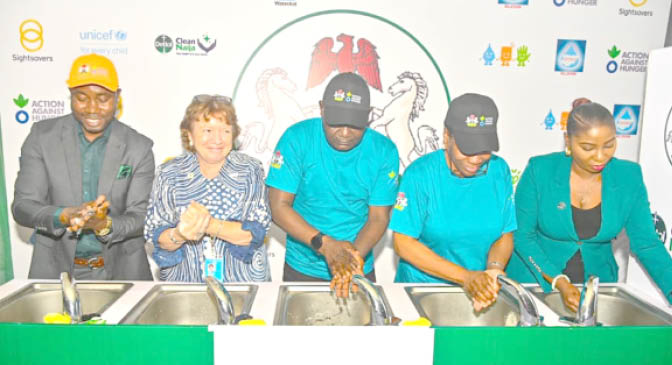FG to integrate handwashing into devt plans
The Federal Government Tuesday said it would integrate hand hygiene into the national response and long-term development strategies. The Minister of Water Resources and Sanitation, Prof. Joseph Utsev, announced this during an event to mark the 2024 Global Handwashing Day event in Abuja with the theme, ‘Why Are Clean Hands Still Important?’ Utsev represented by […]

officials at the celebration of 2024 world handwashing day in abuja on tuesday
The Federal Government Tuesday said it would integrate hand hygiene into the national response and long-term development strategies.
The Minister of Water Resources and Sanitation, Prof. Joseph Utsev, announced this during an event to mark the 2024 Global Handwashing Day event in Abuja with the theme, ‘Why Are Clean Hands Still Important?’
Utsev represented by the Ministry’s Permanent Secretary, Mr Richard Pheelangwah, noted the government’s commitment to embedding handwashing practices into national resilience plans and called on institutional actors to support efforts to scale up hand hygiene initiatives across communities.
The minister emphasised the importance of a multi-faceted approach, including public campaigns, accessible hygiene facilities, regular monitoring, and behavior reinforcement.
- Lawmakers want FERMA to get 20% of works ministry budget in 2025
- Absolute LG autonomy will cause chaos, Soludo warns after signing LG law
He recommended that handwashing facilities should be made available in all households, schools, healthcare facilities, workplaces, and public spaces and must be accessible to people with disabilities to ensure equitable access.
“Nigeria has recently faced a resurgence of cholera outbreaks, exacerbated by inadequate hygiene practices and poor access to safe water and sanitation facilities.
“Cholera, a water-borne disease, thrives in environments where sanitation and hygiene are compromised, leading to widespread illness and fatalities, particularly in underserved communities.
“This underscores the urgent need for a balanced approach that promotes hygiene alongside improvements in water supply and sanitation”.
Dr Edwin Isotu-Edeh, representing the World Health Organisation (WHO), highlighted efforts to combat the cholera outbreak in Lagos, including the installation of handwashing stations and the donation of hygiene materials to 10 healthcare facilities.
Isotu-Edeh encouraged Nigerians to make hand hygiene a daily habit for disease prevention, particularly after using the toilet, preparing food, changing diapers, or handling animals, and to promote the practice to others.
Mr Nanpet Chuktu, from WaterAid, emphasised the effectiveness of handwashing with soap and water in preventing diseases and saving lives.
